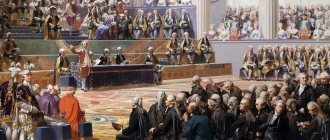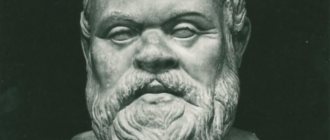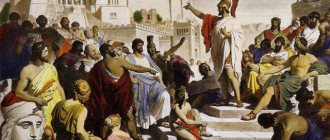History of origin
Rhetoric arose in the 5th century BC. Empedoclonus, according to Aristotle, is considered the inventor of a new form of art. And the first work in rhetoric is a treatise by Empedoclonus’ student, Corax.
Unfortunately, the treatise has not survived to this day; its contents became known from the works of ancient writers. Corax was a trial lawyer and was a favorite of the Syracusan tyrant Heron.
He was the first to formulate a definition of rhetoric: “Eloquence is the worker of persuasion.” He did not stop there and defined the composition of oratory, which is still used today, dividing it into main parts:
- Introduction.
- Offer.
- Presentation.
- The proof is in the struggle.
- Conclusion.
Corax expressed the opinion (and adhered to it) that the goal of the speaker is not to reveal the truth, but to clearly and convincingly speak with the help of sophisms (deliberately false conclusions).
Varieties of speaker speech
There are several types of oratory, depending on who needs to be convinced, where the speech takes place, and what purpose it pursues. These include the following eloquences:
- Social and political. This is when they read reports touching on social, political and economic topics, speak at rallies, and conduct campaigning.
- Academic. This includes reading lectures, scientific reports or communications.
- Judicial. This type of eloquence is used by the prosecutor and defense attorney when speaking in court. With their speech they must convince of the guilt or innocence of the accused person.
- Social and everyday life. It is used by all people when making speeches at anniversaries, feasts or funerals. This also includes small talk, which does not require disputes or discussions, but is characterized by ease and simplicity of perception.
- Bogoslovskoe. This eloquence is used in churches, for example, when believers give a sermon or other speech in a cathedral.
- Diplomatic. This type involves compliance with ethical standards in business speech. This is necessary during business negotiations, correspondence, when drawing up official documents, as well as during translation.
- Military. This type of eloquence is used when calling for battle, issuing orders, regulations, and transmitting information via radio communications.
- Pedagogical. This includes presentations by teachers and students, both oral and written. This also includes giving lectures, which is considered a complex act of pedagogical communication.
- Internal, or imaginary. This is the name of the dialogue that every person conducts with himself. This type involves mental preparation for oral presentation to the public, as well as for written transmission of information, when a person reads what is written to himself, remembers something, reflects on something, and so on.
Based on the above, we can conclude what rhetoric is and why society needs it. Rhetoric as the science of oratory involves the study of the correct pronunciation of speech in front of an audience in order to somehow influence the people listening to it. With its help, speakers acquire skills that allow them to make their speech correct, appropriate, and most importantly, convincing.
Founders
The next founder of rhetoric is considered to be Corax’s student, Lysias. He continued to develop, like his teacher, a system of sophistic proofs.
He especially praised the “crocodile” (logical paradox) of his teacher. He also had students. Part of the teaching methodology was to memorize passages from famous speeches of famous public people.
One of his students was Gorgias of Leontius. He went further than his teacher. He was able to convincingly turn the truth around in his speeches. For example:
- pass off the old as new, and the new as old;
- express completely contradictory views about the same thing.
Gorgias was sure that the most important thing is not the truth, but the probable. He had students and followers. His teaching method did not differ from the method of Lysias, his teacher - memorizing passages from the works or speeches of the best speakers.
His legacy left an interesting work - the treatise “On a Decent Occasion.” In it, Gorgias teaches how serious arguments can be destroyed by mockery, and mockery can be answered with dignity.
From the school of Gorgus came world-famous orators: Paul, Agrigentius, Licymnius, Thrasymachus, Even, Theodore of Byzantium, Protagoras, Prodicus, Isocrates.
The next famous names for history in the field of rhetoric were: Aristotle, Cicero, Quintilian.
The importance of ancient rhetoric for world culture
Rhetoric originated and developed in Ancient Greece, then its teaching went beyond the country and spread to Ancient Rome, then to Western Europe, then to Eastern Europe, to the Slavs.
Let's say more, oratory has not lost its relevance today. Throughout the development of mankind, the works of ancient speakers have been and are being studied.
The talent of persuasion and the skill of oratory was and is in demand at all times and anywhere in the world on Earth.
- The works of the masters of ancient rhetoric were and are the subject of controversy and admiration.
- They became the foundation for the emergence of new sciences: philosophy, logic, linguistics, functional stylistics, speech culture.
- They are studied at universities in the faculties of philosophy, linguistics, psychology and jurisprudence;
- Rhetoric has become part of a quality liberal arts education.
- Eloquence courses are very popular, which help to acquire persuasion skills, increase the self-esteem of an individual, and cure “tongue-tiedness.”
Rhetoric of Ancient Greece
The period of the birth of the art of rhetoric falls on the period of Athenian democracy.
This was due to the fact that a citizen who went to court had to construct his own speech for defense or prosecution. It was the ability to formulate one’s thoughts, convincingly explain and prove that influenced the outcome of the decision of this court.
At that time, mastery of oratory was so valued that it made it possible to make a brilliant political career. Because in governing the state the opinion of the People's Assembly and the Council of Five Hundred was of great importance.
The creators of the art of rhetoric are considered to be the sophists, who did not particularly possess moral and ethical principles. But they had a talent for eloquence and the ability to control and manipulate the consciousness of the crowd.
The founder of high rhetoric was Socrates. He believed that the sophists deliberately used false reasoning, and became an ardent opponent of their teachings.
He based his teaching on the use of true concepts and logical evidence in argument. I was sure that this was what would ensure real victory.
Aristotle made a huge contribution to the development of rhetoric by systematizing the knowledge available at that time. One of his works is the treatise “Rhetoric,” consisting of 3 books.
Aristotle deduced the basic laws of rhetoric, which are still fundamental today for any public speaker.
Interesting for history is Demosthenes, a student of Socrates and Plato. He had tongue-tiedness and a fear of crowds. However, he managed to overcome these obstacles thanks to his determination and perseverance.
His primitive method of dealing with sly tongues is still used by students of the beautiful word. These are pebbles in the mouth.
During the Middle Ages, interest in rhetoric waned and was renewed with renewed vigor in the 19th century. Our compatriots made a huge contribution to its development: M.V. Lomonosov, M. Montel.
An example of oratorical talent is L. Trotsky. Nowadays, rhetoric continues its development, constantly turning to the works of the masters of oratory of Ancient Greece.
Related posts:
- What is "War and Peace" about? Summary of the novel “War and Peace” by chapters. All answers...
- Rhetoric - traditional and modern Modern rhetoric - the origins of oratory. Rhetors of the times of Ramus and...
- Why a teacher needs to master the basics of pedagogical rhetoric Rhetoric teaches us how to correctly convey our thoughts to our interlocutors in...
- P.P. Ershov “The Little Humpbacked Horse” - summary of “The Little Humpbacked Horse” by P.P. Ershov - a very brief summary for the reader...
Theory of rhetoric - Speech practice of Greco-Roman antiquity
Page 4 of 66
Speech practice of Greco-Roman antiquity.
The development of Greek oratory is associated with the flourishing of the Athenian slave-owning democracy, the Greek polis (city-state). It is known that all political figures in Athens were outstanding orators. They had to speak and debate in the people's assembly, in the council of five hundred, in the jury. The commander spoke in front of the army, a private person - at festivals, friendly meetings, funerals, etc. Various spheres of life have given rise to three main types of eloquence: political (deliberative), epideictic (solemn, ceremonial) and judicial.
Oratory for a long time existed only in oral form. Samples of speeches, even the most interesting ones, were not recorded. Only sophistry in the second half of the 5th century. BC e. introduces written recording of speech. The sophists, “masters of wisdom,” considered it their task to instill in their students the art of speaking well and convincingly on issues of politics and morality. To do this, they were forced to memorize entire speeches, which were considered models of eloquence, standards to follow.
On the basis of practical eloquence, the sophists also developed the theory of oratory - rhetoric. The opening of the first rhetorical schools and the creation of the first textbooks on rhetoric are traditionally associated with the names of the sophists Coracus and Tisias from Syracuse (mid-5th century BC)
The sophist Gorgias of Leontina (485-380 BC) received recognition and contribution to the theory of eloquence. This rhetorician paid main attention to issues of style. To enhance the psychological impact of speech, he used stylistic means of decoration, known as Gorgias figures. Among them are antithesis (a sharply expressed opposition of concepts), oxymoron (a combination of concepts that are opposite in meaning), division of sentences into symmetrical parts, rhyme endings, alliteration (playing with consonant sounds), assonance (repetition for the purpose of euphony and expressiveness of similar vowel sounds, especially relevant in verse), etc. Gorgias attached great importance to the word and its effect on the listeners, since he believed that the word is a great ruler who, possessing a very small and completely invisible body, performs the most wonderful things. For it can instill fear, destroy sadness, instill joy, and awaken compassion.
Gorgias's contemporaries, the sophists Thrasymachus, Protagoras and others, developed and enriched the theory of eloquence. Thrasymachus developed a period - a complex sentence of significant length, including secondary sentences that in different aspects reveal the meaning of the main one. An important role in the period is played by intonation, which creates tense anticipation of the end of the utterance, and pauses, dividing the period into speech bars, or columns. This division correlates with the physiology of speech, since it is determined by exhalation, during which only a certain number of words can be pronounced. Protagoras named situationally determined types of speech (request, question, answer, order) and gave their detailed characteristics. Thanks to the works of the sophists, rhetoric gains greater recognition and is included in the range of sciences required for the education of citizens.
Unlike the sophists, who studied primarily the psychological impact of speech on listeners, the ancient Greek philosopher Socrates (470-399 BC) puts logical proof in first place, because “the right thought gives rise to the right action.” The name of Socrates is also associated with the development of dialogue in its various forms - from calm conversation to intense polemics.
Finding out the truth in a dispute was called eristics. The components of Socratic eristics were irony and maieutics (translated from Greek as “the art of the midwife”). Irony was expressed in the philosopher’s ability to lead his opponent into a logical dead end with a witty system of questions and answers. Maieutics contributed to the formation of correct thought. Socrates believed that with his question-and-answer method and logic, he contributed to the birth of the correct thought in a conversation, just as a midwife helps a person to be born.
The main direction of oratory in the ancient era remained monologue. In the II century. BC e. a canon (model, set of rules) of ten Attic orators was compiled. The authors of the canon were, apparently, the most famous and influential rhetoricians: Antiphon, Andocides, Lysias, Isocrates, Iseus, Lycurgus, Demosthenes, Hyperides, Dinarchus, Aeschines. These speakers were different in the nature of their talent, political orientation, and in the genres in which they most fully demonstrated themselves.
Thus, Lysias is considered an outstanding judicial orator, although he himself spoke only once in court. Basically, he composed speeches to order, that is, he was a logographer. The logographer’s task was to ensure that the speech he wrote sounded natural in the mouth of the speaker, who had to defend his interests in court. To do this, it was necessary to know well the social environment of your client, the circumstances of the case that caused the litigation, temperament and character, mental development and, of course, the peculiarities of the client’s speech.
Lysias successfully coped with this task and was known as an excellent storyteller, whose speeches captivated the judges and those present with their entertaining and vivid language.
At the time of Lysias, the structure of judicial speech was already developed. It consisted of four parts: an introduction, where the speaker tried to ingratiate himself with the judges; narration, i.e. a statement of the circumstances of the case being examined; argumentation containing arguments and facts to support the speaker’s correctness; a conclusion in which the speaker sought to discredit his opponent.
The most famous political orator during the era of Greek independence was Demosthenes (384-322 BC). He did not become famous immediately. Nature took bad care of the future speaker: he had a weak voice, poor diction, and a bad habit of twitching his shoulder. His first performance was a failure. To improve his diction and develop the strength of his vocal cords, he went to the seashore, put sea pebbles in his mouth and spoke, trying to shout above the sound of the surf. With much effort, he overcame his natural limitations and became an orator, devoting his life to the struggle for the independence of Athens.
Demosthenes was fluent in the diverse techniques of oratory developed by Greek eloquence; He especially often resorted to stylistic figures, emphasizing and accompanying words with gestures. His speeches were distinguished by the strength of argumentation, passion, conciseness of style, clarity and brevity, and purity of language. They made an indelible impression on the listeners and readers of antiquity, and were and remain the subject of study for orators. The famous rhetorician, writer and historian Dionysius of Halicarnassus, who lived 400 years later, wrote: “When I pick up the speech of Demosthenes, I am inspired... Torn apart by various passions, I believe, am lost, fear, despise, hate, regret, sympathize, anger, envy , in me all the passions that have ever taken possession of the human soul are replaced” [History of Greek literature: in two volumes M., 1955, vol. 2, p. 289].
The master of epideictic eloquence was the rhetorician and publicist Isocrates (436-338 BC). Possessing a weak voice, he was forced to give up public speaking, but he composed and published speeches intended for reading, and ran a rhetoric school. The purpose of education at this school was to teach the art of words in the sphere of government activities.
Isocrates' prose is characterized by a long period that syntactically and rhythmically organizes the meaning of the statement, giving it special strength and expressiveness. An example of such a period is a fragment from the praise of the Cypriot king Evagoras: “He took the best from every political reform; he possessed the qualities of a people's leader, because he surrounded the people with care; a statesman - because he managed to manage the entire state; an excellent commander - because he maintained prudence in the face of danger; finally, a wise ruler - because in all this he was different from others” [Isocrates. Per. E. D. Frolova // Bulletin of Ancient History. 1966, No. 4, p. 246].
<< Previous — Next >>







